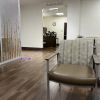Overcoming the Physical Limitations of Heart Disease: A Personal Approach
As a cardiologist, I often have conversations with my patients about the challenges they face when living with heart disease. Heart disease can significantly affect a person’s physical ability, causing limitations in daily activities, energy levels, and overall well-being. When I talk to patients about managing these limitations, it’s not just about the medical treatments—they also need support in adjusting to these changes in their lives. In this article, I’ll share my insights into how to cope with the physical limitations of heart disease, offering practical advice, and sharing real stories from patients who have successfully navigated these challenges.

1. Understanding the Physical Limitations of Heart Disease
Heart disease impacts the heart’s ability to pump blood efficiently, which can lead to various physical symptoms like fatigue, shortness of breath, chest pain, and swelling in the legs and abdomen. These symptoms can make everyday activities, such as walking up stairs or even carrying groceries, feel daunting. Over time, as the heart’s function is compromised, it’s normal for people to experience limitations in their physical capacity.
Take my patient, Carol, for example. She was diagnosed with heart failure at the age of 70. At first, simple tasks like grocery shopping or walking around the block left her exhausted and short of breath. It was a real blow to her independence, but with the right management strategies, she was able to adapt. Today, Carol manages her condition by making small adjustments that allow her to lead an active life despite the physical limitations that come with heart disease.
Atlanta Heart Specialists
atlanta heart specialists
4375 Johns Creek Pkwy #350, Suwanee, GA 30024, USA

2. Tailoring Physical Activity to Your Abilities
One of the most important aspects of managing the physical limitations of heart disease is staying active. While it may seem counterintuitive to exercise with a heart condition, physical activity can actually help improve heart function and quality of life. The key is to start slow and find exercises that are both safe and effective for your individual condition.
For patients like Carol, I recommend low-impact exercises such as walking, swimming, or stationary cycling. These activities are gentle on the heart and joints while still providing significant cardiovascular benefits. I also emphasize the importance of gradual progression. Starting with just 10-15 minutes a day can help build strength and stamina over time, without overtaxing the heart.
Another important factor to consider is pacing. I encourage my patients to listen to their bodies. If they start feeling lightheaded, dizzy, or extremely fatigued, they should stop and rest. Exercise should never feel like a burden; instead, it should be a source of strength and well-being. For instance, Mark, a 65-year-old patient of mine, started with short walks every morning. Over time, he increased his walking duration and even began doing gentle yoga. He now enjoys an active lifestyle without overexerting himself.
3. Managing Fatigue: A Common Challenge
Fatigue is one of the most common symptoms that patients with heart disease report. The decreased efficiency of the heart can lead to reduced oxygen flow to the muscles, which causes tiredness. Managing fatigue requires both lifestyle adjustments and careful attention to the body’s needs.
One effective strategy I recommend is pacing yourself throughout the day. It’s important to take breaks between activities to avoid overexertion. For example, after a short walk or doing household chores, taking a 10-15 minute rest can help recharge your energy levels. It’s also crucial to prioritize sleep. A well-rested body is better equipped to manage the physical demands of heart disease. I always tell my patients that sleep is as important as any medication or treatment they might be taking.
Take the story of Tom, a 72-year-old man who found himself feeling drained even after minimal physical exertion. By breaking up his daily tasks into smaller segments and ensuring he took frequent rests, Tom was able to reduce his fatigue. He also worked with a physical therapist to incorporate strength-building exercises that helped improve his stamina over time. Now, Tom can enjoy playing with his grandchildren again, something he thought was no longer possible.
4. Nutritional Support: Fueling the Body for Energy
Nutrition plays a crucial role in managing the physical limitations of heart disease. A heart-healthy diet can improve energy levels, support weight management, and help maintain overall cardiovascular health. I always emphasize the importance of a balanced diet that includes whole grains, lean proteins, healthy fats, and plenty of fruits and vegetables.
Foods rich in antioxidants, omega-3 fatty acids, and fiber can help reduce inflammation, improve blood flow, and support the heart. For example, foods like salmon, leafy greens, nuts, and berries are great choices for anyone managing heart disease. Additionally, limiting salt intake is key to managing blood pressure and fluid retention, which can exacerbate heart failure symptoms like swelling and shortness of breath.
Mary, a 68-year-old patient, found that her energy levels improved dramatically when she adopted a heart-healthy diet. By focusing on whole, nutritious foods and eliminating processed items, she felt stronger and was able to better manage her heart disease. Her doctor and nutritionist worked together to develop a meal plan that supported her heart health and reduced the burden of fatigue.
5. Coping with Emotional and Mental Health Challenges
Heart disease doesn’t just affect the body—it also takes a toll on mental and emotional well-being. Many people with heart disease struggle with feelings of anxiety, depression, and frustration over their physical limitations. It’s important to address these emotional challenges alongside the physical ones.
I encourage my patients to seek support from family members, friends, or support groups. Talking about your feelings and sharing experiences with others who are going through similar challenges can be incredibly therapeutic. Additionally, mindfulness and relaxation techniques, such as deep breathing exercises, meditation, or even gentle yoga, can help reduce stress and improve mental clarity.
For instance, Susan, a 75-year-old patient, found that attending a weekly heart disease support group helped her cope with the emotional impact of her condition. She also practiced mindfulness meditation, which helped her manage anxiety about her limitations. These emotional tools were just as important in her recovery as her physical therapy sessions.
6. Assistive Devices and Technologies to Support Physical Limitations
For those with more severe physical limitations, assistive devices and technologies can make a world of difference. Tools such as walkers, canes, and even home monitoring devices can help manage the physical challenges that come with heart disease. These devices can increase mobility, reduce the risk of falls, and provide peace of mind for both patients and their families.
John, an 80-year-old patient, used a heart monitor to track his vital signs throughout the day. This allowed him to feel more in control of his health and avoid unnecessary trips to the doctor. He also used a walking aid when going out for walks, which provided additional stability and confidence. With the right tools, John was able to maintain an active lifestyle despite his heart condition.
At HeartCare Hub, we are committed to helping patients manage the physical limitations of heart disease. Whether it’s through personalized care, lifestyle advice, or access to the latest medical technologies, we provide the support needed to improve quality of life. If you or a loved one are living with heart disease, don't hesitate to reach out for guidance and care tailored to your needs.






















Deborah Heart and Lung Center
deborah heart and lung center
200 Trenton Rd, Browns Mills, NJ 08015, USA